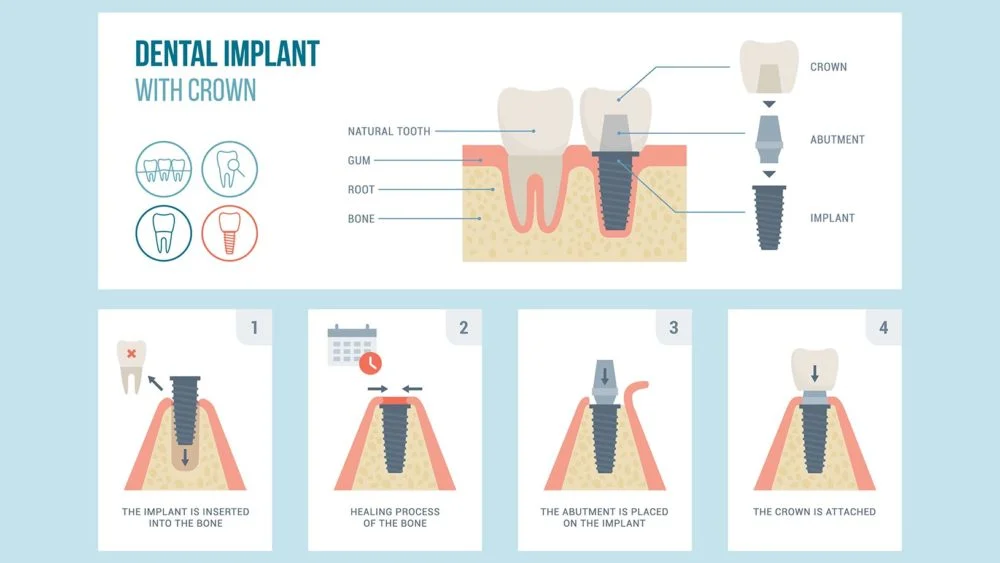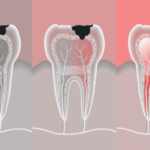A Complete guide to Dental Implants Process and Timeline

If you’re missing teeth, then dental implants can replace them. The implants will look, feel, and function like your natural teeth, so you’ll feel more self-confident. A tooth implant is an artificial tooth that’s anchored to your jawbone by a titanium post, so it won’t slip or move or fall out. If you’re wondering how are dental implants done, then read on to learn more about the dental implants process and how Omega Dental can restore your beautiful smile with a tooth implant or several of them.
Table of Contents
What is the Dental Implant Procedure?
The time needed for the entire dental implant procedure can range from a single office visit to a two-year dental implants process timeline It depends on the complexity of your dental issues. The most common issues that will extend the tooth implant timeline are the need for bone grafting and tooth extractions. If you don’t need either of these and simply need a single tooth implant, then we may be able to install your dental implant in one office visit that takes about two hours.
The following steps may help to explain the dental implant procedure in more detail. When you come to Omega Dental Specialists for a dental implant, you can expect the following:
Initial Consultation
During your initial consultation, you’ll probably need an x-ray, you may need a CT scan, and we’ll take impressions of your teeth. You may also need to see some specialists, including a:
- General dentist
- Ear, nose, and throat specialist, or ENT
- Oral surgeon
- Orthodontist
- Periodontist
- Prosthodontist
We’ll review your medical history and we’ll need to know if you have any underlying medical conditions that could affect the outcome of your procedure. If you have any stage of gum disease, then we’ll treat that first before beginning the tooth implant process. If everything looks good, then we’ll develop a tooth implant treatment plan that’s specifically tailored to your needs.
If you’re a smoker, then you’ll need to quit smoking for the duration of the steps of getting a tooth implant.
Your doctor will determine whether you need a bone graft to accommodate your tooth implant. If you do, then we’ll let you know what to expect from the procedure and how it will affect your dental implant stages. We’ll also discuss the cost of bone grafting, thetooth extraction cost, the dental implant cost, and we’ll provide you with your dental implant cost breakdown as well as a dental implants process timeline that’s tailored to your unique needs. Your dentist will also discuss the stage 2 dental implant surgery process with you and explain the benefits as well as the drawbacks of the procedure.
Although bone grafts and tooth extractions are the most commonly needed procedures prior to a tooth implant, not everyone needs either of them. If your jawbone is sturdy enough to support the implant, then you shouldn’t need a graft. If the tooth is missing at the implant site, then you won’t need an extraction. However, if there is a damaged tooth on the site, then you’ll need an extraction.
Dental Extractions
The complexity of your dental extraction will depend on several factors and may add to both the cost and the length of time it takes for your dental implant process. If you have an impacted tooth, then you’ll need oral surgery to remove it. This will add to the total cost of the implant procedures as well as the number of dental implant stages needed for the overall procedure. If your tooth is broken or damaged, you may need oral surgery. If it’s simple tooth extraction, then the timeline shouldn’t be adversely affected. However, the more complex the extraction procedure, the more costly it will be. The type of anesthesia used will also affect the recovery time as well as the cost of the procedure.
Bone Grafting
Bone grafting for dental implants is needed when the jawbone lacks the strength to support the implant. Usually, bone is taken from another part of the body and grafted into the jawbone, but synthetic bone is also used. This thickens the jawbone so that it can support the implant, but it will add significantly to the amount of time that your tooth implant process requires. Usually, bone graft healing takes between 4 and 12 months and requires several follow-up appointments to ensure that healing is progressing satisfactorily.
Dental Implant Surgery Step by Step
Dental implant surgery requires several steps that are independent of the preparatory steps or the aftercare steps. When you arrive in our office for your dental implant surgery, you’ll be given a sedative before we start any work. Your dentist will discuss the sedation options with you first, and then we’ll sedate you. Usually, we use an IV, a local injection, or general sedation.
Next, we’ll make a cut in your gums so that the jawbone is exposed. We’ll use a small drill to make a hole so that we can insert the titanium implant into your jawbone. We use titanium because it’s very strong, but it’s also very lightweight and has virtually no history of rejection by the body. This procedure can take as long as two hours and when you leave, you’ll probably have sutures in the area. Sometimes, you’ll need to return to our office to have the sutures removed, but this will be in a week or two. It can take up to six weeks for the incision to heal and it’s imperative to follow your dentist’s care instructions during this time. Otherwise, you can have dental implant failure. If you prefer, you can wear a temporary denture or crown during the healing process. Be sure to advise your dentist if you want a temporary. Implant procedure pain can usually be managed through the use of over-the-counter pain medication. If it becomes too severe, then notify your dentist.
You’ll receive a healing collar to wear for about two weeks. This ensures that the gums won’t heal over the implant. If it comes off, be sure to notify your dentist so that you can return to have it reinstalled. During the healing time, a process known as osseointegration will take place.
Learn more about dental implants surgery step by step
Osseointegration
Osseointegration is the process whereby the tissues form around the post and assimilate it into the jawbone so that it becomes permanently implanted into the bone. The implant material is biocompatible, which means that your body shouldn’t reject it during the fusing process, and it will become a permanent part of your jawbone. Usually, this process takes three to six months for the lower jaw and up to seven months for the upper jaw. However, smoking during this time can cause the entire process to fail, so it’s imperative that you quit smoking beforehand.
Placing the Abutment
Once your gums have healed, you’ll return so that we can complete the final step in the dental implant abutment procedure. The abutment secures the crown in place but is sometimes installed at the same time as the metal post. Although the recovery from the abutment installation usually takes about two weeks, it will take about six weeks for us to complete the fabrication of your permanent crown, so you’ll need to have a temporary crown to cover the gap.
Placement of the Artificial Tooth or Teeth
Placement of the temporary and permanent crowns is the last of the dental implant procedure steps. Once your mouth has fully healed and osseointegration is complete, then we’ll make impressions of your teeth and mouth and use these impressions to fabricate your temporary and permanent artificial tooth or teeth. You’ll receive a temporary to-wear until fabrication is complete, and then you’ll return for the placement of the permanent dentures, the last in your dental implant process steps. We’ll permanently affix the teeth to your abutment by cementing it or screwing it onto the post, and then you’ll be finished. If you’ve elected to receive removable dentures, also called snap-in dentures, you’ll receive them in pink plastic gums that you snap onto your abutment and can remove for cleaning and maintenance.
Summary of the Step by Step Dental Implant Procedure
If you’ve decided that dental implants are your best option, then briefly, you’ll experience the following:
- Consultation with your dentist
- Establishing a treatment plan
- Performing all prerequisite procedures to ensure a good outcome, including extractions and bone grafts
- Allow for healing time for procedures
- Return for placement of post
- Allow time for gums to heal
- Return for placement of the abutment and taking impressions
- Return for installation of your crown
The following information may help you determine the approximate length of time that your treatment will take:
- Initial consultation: to evaluate your teeth and gums and to formulate a treatment regimen Up to a few weeks, depending on our scheduling
- Bone grafts: Several weeks to schedule and as long as a year to heal
- Extractions: Several weeks for scheduling and as many as 10 days to heal
- Implant placement: About two hours
- Osseointegration: Upper jaw can take as long as seven months, lower jaw as long as five months
- Healing collar: Must be worn for a maximum of two weeks
- Placing abutment: Two weeks for placement and healing
- Temporary crown: Can be worn for as long as six weeks, depends on the time needed to fabricate the permanent crown
- Placement of artificial teeth: Two dental visits which can span several weeks
- Post-surgical follow up: A few days for healing, then a checkup within a few weeks
If you’ve elected to have full mouth dental implants or all on 4 dental implants or all on 6 dental implants, then you’ll need more than one implant installed. Usually, with an all-on-4, you’ll have six implants in the upper jaw and
four in the lower jaw. These types of implants are typically used for those who are missing a significant number of their teeth and can be used with either fixed or removable dentures and can be completed in less time than a single implant that requires a bone graft.
If you live in the Houston Texas area and are interested in dental implants, then call one of the best dental implant specialists in Houston, Omega Dental Specialists to schedule a consultation. We’re centrally located between downtown and midtown, so no matter your location in Houston, we’re easily accessible. We provide both adult and pediatric dental needs, so if you’re interested in dental implants, then call us today for an appointment. We look forward to speaking with you and working with you.
Ready to start your dental implant journey? Learn more about our dental implants in Houston and discover which option is right for you. Our experienced team at Omega Dental Specialists is here to guide you every step of the way.
February 15, 2023What Is The Average Cost Of Braces In Houston?
February 01, 2023What You Need to Know About Dental Hygienists?
January 30, 2023What to Expect During the Wisdom Teeth Extraction
October 23, 2022Wisdom Tooth Removal Cost



